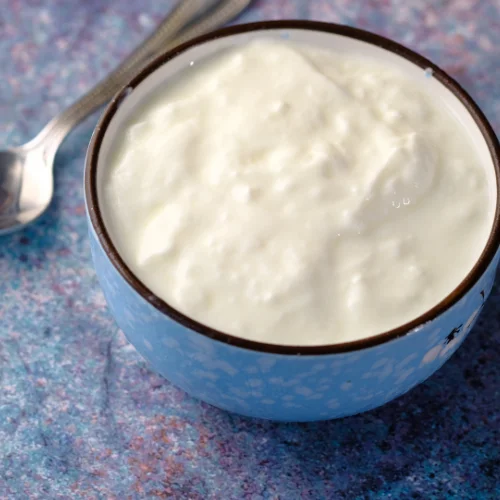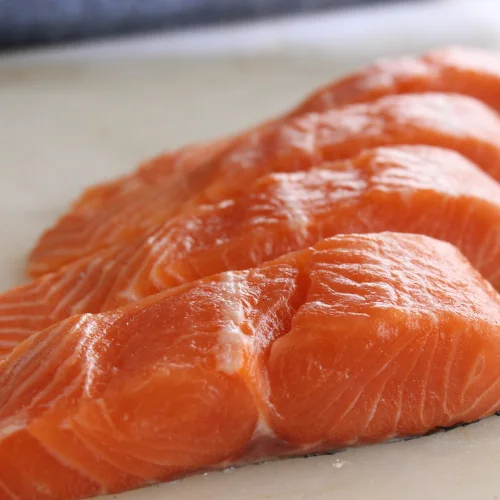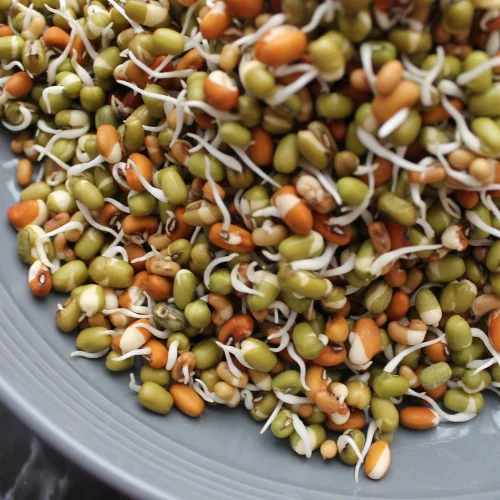10 High-Protein Foods for Seniors
Aging gracefully is a universal desire, and maintaining a healthy diet plays a crucial role in achieving this goal. As we get older, our nutritional needs change, and consuming adequate amounts of protein becomes increasingly important. Protein is essential for the maintenance and repair of body tissues, the production of enzymes and hormones, and the support of a strong immune system. In this blog post, I share 10 protein-rich foods that are particularly beneficial for seniors, helping them stay active, vibrant, and well-nourished.
Here Are the 10 High-Protein Foods for Seniors
1. Greek Yogurt

Greek yogurt is an excellent source of protein for seniors. It contains twice the amount of protein compared to regular yogurt. A single cup of Greek yogurt provides around 20 grams of protein, helping to promote muscle strength and recovery. Furthermore, Greek yogurt is also rich in calcium, which supports bone health and helps prevent osteoporosis.
2. Eggs

Eggs are a versatile and affordable source of high-quality protein. They contain all the essential amino acids required for optimal bodily functions. Apart from being protein powerhouses, eggs are also rich in vitamins and minerals, including vitamin B12, which is essential for nerve health. Seniors can enjoy boiled, scrambled, or poached eggs to increase their protein intake.
3. Quinoa

Quinoa is a gluten-free, whole-grain food that is packed with protein. It is an excellent alternative to rice or pasta and provides about 8 grams of protein per cooked cup. Quinoa is also rich in dietary fiber and contains essential minerals like magnesium and iron, which are beneficial for seniors. Incorporating quinoa into meals such as salads, stir-fries, or pilafs is an easy and delicious way to boost protein intake.
4. Salmon

Salmon is a delicious fish and a fantastic source of protein. It is rich in omega-3 fatty acids, which have been shown to support heart health and reduce inflammation. A 3-ounce serving of salmon provides approximately 21 grams of protein. Grilled, baked, or poached salmon makes for a delightful and nutritious meal for seniors.
5. Lean Meat
Lean meats, such as chicken breast, turkey, and lean beef, are excellent protein sources for seniors. They are low in fat and provide essential nutrients like iron and zinc. Including lean meats in soups, stews, or grilled dishes can help seniors meet their protein requirements while enjoying tasty and satisfying meals.
6. Beans and Legumes

Beans and legumes are plant-based protein powerhouses rich in dietary fiber. They are affordable, versatile, and provide a significant protein boost to vegetarian seniors. Examples include lentils, chickpeas, black beans, and kidney beans. These can be incorporated into soups, and salads, or even made into delicious plant-based patties for added variety.
7. Greek-Style Yogurt

Greek-style yogurt, similar to Greek yogurt, offers a creamy and protein-packed option for seniors. It contains slightly less protein than Greek yogurt but still provides a significant amount. Additionally, it is a great source of probiotics, which promote gut health and support digestion. Seniors can enjoy Greek-style yogurt with fruits or use it as a creamy topping for various dishes.
8. Cottage Cheese
Cottage cheese is another excellent protein option for seniors. It is low in fat and high in protein, providing around 14 grams per half-cup serving. Cottage cheese is also rich in calcium, which is essential for maintaining bone health. It can be enjoyed as a snack or incorporated into salads, smoothies, or desserts for added protein content.
9. Nuts and Seeds

Nuts and seeds are not only rich in healthy fats but also contain a fair amount of protein. Almonds, peanuts, walnuts, chia seeds, and flaxseeds are all good options. Seniors can snack on a handful of nuts or seeds, sprinkle them over salads or yogurt, or use them as an ingredient in baking for a protein and nutrient boost.
10. Tofu and Tempeh
For seniors following a vegetarian or vegan diet, tofu and tempeh are valuable sources of protein. Tofu is made from soybeans and provides approximately 8 grams of protein per 3-ounce serving. Tempeh, made from fermented soybeans, offers even more protein, with around 16 grams per 3-ounce serving. Both tofu and tempeh are versatile ingredients that can be used in stir-fries, soups, and other dishes.
How much protein do seniors need daily?
Protein is an essential nutrient for seniors as it plays a crucial role in maintaining and repairing body tissues, supporting immune function, and promoting overall health and well-being. However, the recommended daily protein intake for seniors may vary depending on various factors such as age, gender, activity level, and underlying health conditions. In general, it is recommended that seniors consume an adequate amount of protein to meet their nutritional needs.
The recommended dietary allowance (RDA) for protein for adults, including seniors, is set at 0.8 grams of protein per kilogram of body weight. However, some experts suggest that seniors may benefit from slightly higher protein intake to counteract age-related muscle loss and promote healthy aging.
For example, the International Society of Sports Nutrition recommends that older adults engage in resistance exercise and consume 1.2 to 2.0 grams of protein per kilogram of body weight per day to optimize muscle protein synthesis.
To put this into perspective, let’s consider an example. Suppose a senior weighs 70 kilograms (154 pounds). Based on the RDA, their protein intake should be around 56 grams per day (70 kg x 0.8 g/kg).
However, if they follow the higher end of the recommended range by the International Society of Sports Nutrition, their protein intake could range from 84 grams to 140 grams per day (70 kg x 1.2 g/kg to 70 kg x 2.0 g/kg). It’s important to note that these numbers are general guidelines and individual needs may vary.
Transitioning to the next point, it’s worth noting that seniors may face challenges in meeting their protein needs due to factors such as reduced appetite, dental issues, or difficulty in chewing and swallowing. In such cases, it becomes crucial to choose protein-rich foods that are easy to consume and digest.
Examples of protein-rich foods suitable for seniors include lean meats, poultry, fish, eggs, dairy products, legumes, tofu, and nuts. Additionally, incorporating protein supplements or fortified foods can be an option for those struggling to meet their protein requirements.
Moreover, seniors can also benefit from spreading their protein intake evenly throughout the day. Consuming protein-rich meals or snacks at regular intervals helps optimize muscle protein synthesis and prevent muscle wasting.
For instance, a senior could include a serving of Greek yogurt or cottage cheese with fruits for breakfast, have a chicken or fish-based lunch, and enjoy a small handful of almonds as an afternoon snack.
Are there any specific dietary restrictions or considerations for seniors when it comes to protein-rich foods?
Firstly, seniors may experience a decrease in appetite, which can make it challenging for them to consume an adequate amount of protein. To overcome this obstacle, it is crucial to incorporate protein-rich foods that are also appealing and flavorful. For instance, including lean meats, poultry, fish, eggs, or legumes in tasty dishes like stews, soups, or stir-fries can enhance palatability and increase the chances of seniors enjoying their meals.
Moreover, with advancing age, individuals tend to experience a gradual loss of muscle mass known as sarcopenia. To combat this, seniors should focus on consuming high-quality protein sources that provide essential amino acids necessary for muscle maintenance and repair.
Animal-based proteins like lean meats, fish, and dairy products are considered complete proteins, as they contain all the essential amino acids. Plant-based protein sources, such as legumes, nuts, seeds, and whole grains, can be combined strategically to create complementary amino acid profiles, making them valuable options for seniors following a vegetarian or vegan diet.
Furthermore, digestion and absorption of nutrients can become less efficient as individuals age. To ensure optimal nutrient absorption, older adults should prioritize easily digestible protein sources. Soft and tender meats, poultry, and fish can be preferred over tougher cuts.
Alternatively, incorporating protein-rich options like yogurt, cottage cheese, or protein shakes can benefit seniors with compromised digestive function, as these options are typically easier to digest.
Lastly, seniors may have specific chronic health conditions that require them to make dietary modifications. For instance, individuals with kidney disease may need to limit their protein intake, as excess protein can strain the kidneys. In such cases, consulting with a healthcare professional or registered dietitian is crucial to determine the appropriate protein intake and identify protein sources that align with the individual’s specific needs.
Where can I buy protein-rich food for cheap?
When looking for protein-rich food at an affordable price in the USA, there are several options available that can help you meet your dietary needs without breaking the bank. One of the best places to start is your local grocery store.
Supermarkets often have a variety of protein-rich foods, such as eggs, canned tuna, and beans, at competitive prices. These options provide a good balance between cost and nutritional value.
For instance, a dozen eggs can be a budget-friendly source of protein, with each egg containing around 6 grams of protein. Canned tuna is another economical choice, offering approximately 20 grams of protein per 3-ounce serving.
In addition to traditional grocery stores, discount or bulk food stores can be excellent options for finding affordable protein-rich foods. Stores like Costco, Sam’s Club, or BJ’s Wholesale Club often offer bulk packages of chicken breasts, ground beef, and other protein sources at discounted prices.
Buying in bulk can help reduce the overall cost per serving. For example, purchasing a large package of chicken breasts and freezing them in individual portions can provide a cost-effective way to have protein-rich meals throughout the week.
Another cost-saving strategy is to explore local farmer’s markets or community-supported agriculture (CSA) programs. These options allow you to purchase fresh produce, eggs, and meat directly from local farmers. While prices may vary depending on the location and season, these sources often provide high-quality protein-rich foods at competitive prices. Additionally, purchasing directly from local farmers supports the local economy and promotes sustainable farming practices.
For those on a tight budget, it’s worth considering plant-based protein sources. Legumes, such as lentils, chickpeas, and black beans, are not only rich in protein but are also inexpensive. They can be purchased in dried form and cooked at home for a fraction of the cost of pre-packaged options.
Moreover, tofu and tempeh, made from soybeans, are affordable alternatives to meat. These versatile plant-based protein sources are widely available in most grocery stores and can be used in various recipes, from stir-fries to salads.
Lastly, online shopping platforms and discount retailers can be valuable resources for finding protein-rich foods at lower prices. Websites like Amazon or Thrive Market often offer competitive deals on pantry staples, including protein bars, nut butters, and protein powders.
Additionally, discount retailers like Aldi or Walmart may have a range of affordable protein options. While online shopping may come with shipping fees, it can still be a cost-effective choice when purchasing in bulk or taking advantage of special promotions.
Conclusion
Maintaining a well-balanced diet that includes adequate protein is vital for seniors to support their overall health and well-being. The ten protein-rich foods discussed in this article, including Greek yogurt, eggs, quinoa, salmon, lean meats, beans and legumes, Greek-style yogurt, cottage cheese, nuts and seeds, and tofu and tempeh, offer a wide variety of options to meet seniors’ protein needs.
By incorporating these foods into their daily meals and snacks, seniors can promote muscle strength, support bone health, and enhance their overall quality of life.
I hope this guide has provided valuable insights into protein-rich food choices for seniors. Now it’s your turn! Do you have any other protein-rich foods that you would recommend for seniors? Please share your thoughts and experiences in the comments section below.
